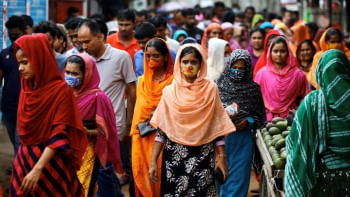ICCB suggests interim govt adopt six reforms

The International Chamber of Commerce Bangladesh (ICCB) has come up with six recommendations for the interim government to bring about reforms in the country's banking, tax, trade and business activities.
ICCB President Mahbubur Rahman provided the proposals to Finance Adviser Salehuddin Ahmed at his office in the Sher-e-Bangla Nagar area of Dhaka on Tuesday.
One suggestion is for bringing about significant reforms in the banking sector, including ensuring full autonomy of Bangladesh Bank and formulating a plan for the reduction of non-performing loans (NPLs), says an ICCB press release.
Strict punitive measures must be taken against wilful defaulters and efforts should be put in to recover money illegally taken out of the country and to prevent a single person or business from securing ownership at multiple banks, as per another advice.
One suggestion is bringing about significant reforms in the banking sector, including ensuring full autonomy of Bangladesh Bank
One recommendation is for bringing about reforms in the National Board of Revenue through the establishment of two separate wings -- one for policymaking and another for tax, customs duty and VAT collections.
The ICCB also suggested expanding the tax net, enabling online submission of income tax returns and fully digitalising the taxation process.
One advice was for updating commercial laws to fully digitalise processes for engaging in international trade, such as issuance of invoices and signing of contracts, to reduce the scope for fraudulence and money laundering.
Regarding the energy sector, the ICCB proposed ensuring reliability in power supplies for industries.
It also suggested strengthening the Bangladesh Petroleum Exploration and Production Company by enhancing its capacity for the exploration of new gas reserves, which would subsequently reduce the need for costly LNG and LPG imports.
Additionally, the ICCB proposed strengthening the capacity of Bangladesh diplomatic missions abroad so that those can engage in economic diplomacy, find new export markets and create job opportunities for skilled and unskilled workers.

 For all latest news, follow The Daily Star's Google News channel.
For all latest news, follow The Daily Star's Google News channel. 



Comments